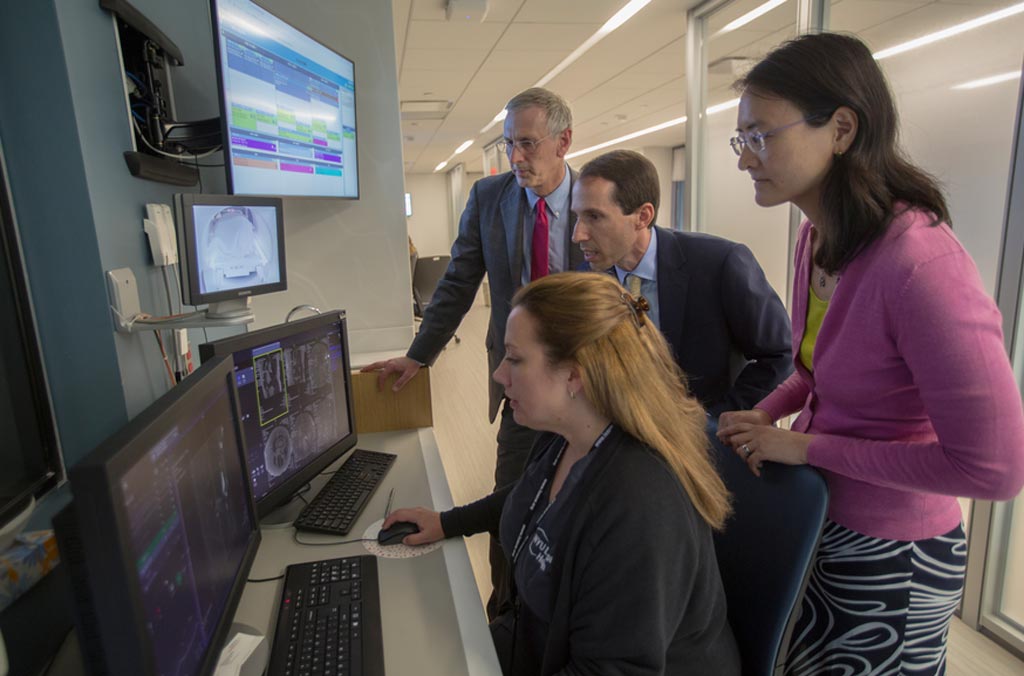Largest-Ever Open-Source Dataset Released to Speed Up MRIs Using AI
|
By HospiMedica International staff writers Posted on 18 Dec 2018 |

Image: NYU School of Medicine Department of Radiology chair, Michael Recht, MD; Daniel Sodickson, MD, PhD, vice chair for research and director of the Center for Advanced Imaging Innovation and Research; and Yvonne Lui, MD, director of artificial intelligence, watch an MRI exam take place with at NYU Langone Health in New York in August 2018.
The NYU School of Medicine’s (New York, NY, USA) Department of Radiology is releasing the first large-scale MRI dataset of its kind as part of fastMRI, a collaborative effort with Facebook AI Research (New York, NY, USA) to speed up MRI scans with artificial intelligence (AI).
The collaboration is aimed at sharing open source tools and spurring the development of AI systems to make MRI scans 10 times faster. The collaboration will promote research reproducibility, provide consistent evaluation methods, and empower the larger community of AI and medical imaging scientists.
Using AI, researchers believe it will be possible to capture less data, and therefore image faster, while preserving or even enhancing the rich information contained in MR images. Leaders of the study say that, if successful, fastMRI could benefit a wide range of people who may have difficulty tolerating lengthy scans, including young children, elderly patients, and claustrophobic individual. It could also decrease the need for anesthesia or sedation. Additionally, the project could expand access to this key diagnostic tool, particularly in areas where there is a shortage of MRI scanners and patients face long wait-times for their scans.
The initial dataset release includes more than 1.5 million anonymous MR images of the knee, drawn from 10,000 scans, in addition to raw measurement data from nearly 1,600 scans. While other sets of radiological images have been released previously, this dataset represents the largest public release of raw MRI data to date. The first phase of the project will involve data from knee MRI scans, but future releases will include data from liver and brain scans. The joint team will also provide a suite of tools, including baseline metrics to compare results, and a leaderboard to keep track of progress as part of an organized challenge to be announced in the near future.
"fastMRI not only could have an important impact in the medical field, it's also an interesting research challenge that will help to advance the field of AI," said Larry Zitnick, Research Manager, Facebook AI Research. "To be medically useful, our AI-reconstructed images need to be more than just good-looking, they must also be accurate representations of the ground-truth, even though they're created from significantly less data. The dataset NYU Langone is releasing and the baseline models we've open-sourced will enable other researchers to join us in working on this challenging problem, and we believe this open approach will bring about positive results more quickly."
“This collaboration focuses on applying the strengths of machine learning to reconstruct high-value images in new ways. Rather than using existing images to train AI algorithms, we will radically change the way medical images are acquired in the first place,” said Daniel Sodickson, MD, PhD, professor of radiology and neuroscience and physiology and director of CAIR. “Our aim is not merely enhanced data mining with AI, but rather creating new capabilities for medical visualization, to benefit human health.”
Related Links:
NYU School of Medicine
Facebook AI Research
The collaboration is aimed at sharing open source tools and spurring the development of AI systems to make MRI scans 10 times faster. The collaboration will promote research reproducibility, provide consistent evaluation methods, and empower the larger community of AI and medical imaging scientists.
Using AI, researchers believe it will be possible to capture less data, and therefore image faster, while preserving or even enhancing the rich information contained in MR images. Leaders of the study say that, if successful, fastMRI could benefit a wide range of people who may have difficulty tolerating lengthy scans, including young children, elderly patients, and claustrophobic individual. It could also decrease the need for anesthesia or sedation. Additionally, the project could expand access to this key diagnostic tool, particularly in areas where there is a shortage of MRI scanners and patients face long wait-times for their scans.
The initial dataset release includes more than 1.5 million anonymous MR images of the knee, drawn from 10,000 scans, in addition to raw measurement data from nearly 1,600 scans. While other sets of radiological images have been released previously, this dataset represents the largest public release of raw MRI data to date. The first phase of the project will involve data from knee MRI scans, but future releases will include data from liver and brain scans. The joint team will also provide a suite of tools, including baseline metrics to compare results, and a leaderboard to keep track of progress as part of an organized challenge to be announced in the near future.
"fastMRI not only could have an important impact in the medical field, it's also an interesting research challenge that will help to advance the field of AI," said Larry Zitnick, Research Manager, Facebook AI Research. "To be medically useful, our AI-reconstructed images need to be more than just good-looking, they must also be accurate representations of the ground-truth, even though they're created from significantly less data. The dataset NYU Langone is releasing and the baseline models we've open-sourced will enable other researchers to join us in working on this challenging problem, and we believe this open approach will bring about positive results more quickly."
“This collaboration focuses on applying the strengths of machine learning to reconstruct high-value images in new ways. Rather than using existing images to train AI algorithms, we will radically change the way medical images are acquired in the first place,” said Daniel Sodickson, MD, PhD, professor of radiology and neuroscience and physiology and director of CAIR. “Our aim is not merely enhanced data mining with AI, but rather creating new capabilities for medical visualization, to benefit human health.”
Related Links:
NYU School of Medicine
Facebook AI Research
Latest AI News
- AI-Powered Algorithm to Revolutionize Detection of Atrial Fibrillation
- AI Diagnostic Tool Accurately Detects Valvular Disorders Often Missed by Doctors
- New Model Predicts 10 Year Breast Cancer Risk
- AI Tool Accurately Predicts Cancer Three Years Prior to Diagnosis
- Ground-Breaking Tool Predicts 10-Year Risk of Esophageal Cancer
- AI Tool Analyzes Capsule Endoscopy Videos for Accurately Predicting Patient Outcomes for Crohn’s Disease
Channels
Artificial Intelligence
view channel
AI-Powered Algorithm to Revolutionize Detection of Atrial Fibrillation
Atrial fibrillation (AFib), a condition characterized by an irregular and often rapid heart rate, is linked to increased risks of stroke and heart failure. This is because the irregular heartbeat in AFib... Read more
AI Diagnostic Tool Accurately Detects Valvular Disorders Often Missed by Doctors
Doctors generally use stethoscopes to listen for the characteristic lub-dub sounds made by heart valves opening and closing. They also listen for less prominent sounds that indicate problems with these valves.... Read moreCritical Care
view channel
Wheeze-Counting Wearable Device Monitors Patient's Breathing In Real Time
Lung diseases like asthma, chronic obstructive pulmonary disease (COPD), lung cancer, bronchitis, and infections such as pneumonia, rank among the leading causes of death worldwide. Traditionally, medical... Read more
Wearable Multiplex Biosensors Could Revolutionize COPD Management
Chronic obstructive pulmonary disease (COPD) ranks as the third leading cause of death worldwide. Acute exacerbations of COPD (AECOPD), which are often triggered by lung infections, accelerate the disease's... Read moreSurgical Techniques
view channel
Flexible Microdisplay Visualizes Brain Activity in Real-Time To Guide Neurosurgeons
During brain surgery, neurosurgeons need to identify and preserve regions responsible for critical functions while removing harmful tissue. Traditionally, neurosurgeons rely on a team of electrophysiologists,... Read more.jpg)
Next-Gen Computer Assisted Vacuum Thrombectomy Technology Rapidly Removes Blood Clots
Pulmonary embolism (PE) occurs when a blood clot blocks one of the arteries in the lungs. Often, these clots originate from the leg or another part of the body, a condition known as deep vein thrombosis,... Read more
Hydrogel-Based Miniaturized Electric Generators to Power Biomedical Devices
The development of engineered devices that can harvest and convert the mechanical motion of the human body into electricity is essential for powering bioelectronic devices. This mechanoelectrical energy... Read moreWearable Technology Monitors and Analyzes Surgeons' Posture during Long Surgical Procedures
The physical strain associated with the static postures maintained by neurosurgeons during long operations can lead to fatigue and musculoskeletal problems. An objective assessment of surgical ergonomics... Read morePatient Care
view channel
Surgical Capacity Optimization Solution Helps Hospitals Boost OR Utilization
An innovative solution has the capability to transform surgical capacity utilization by targeting the root cause of surgical block time inefficiencies. Fujitsu Limited’s (Tokyo, Japan) Surgical Capacity... Read more
Game-Changing Innovation in Surgical Instrument Sterilization Significantly Improves OR Throughput
A groundbreaking innovation enables hospitals to significantly improve instrument processing time and throughput in operating rooms (ORs) and sterile processing departments. Turbett Surgical, Inc.... Read more
Next Gen ICU Bed to Help Address Complex Critical Care Needs
As the critical care environment becomes increasingly demanding and complex due to evolving hospital needs, there is a pressing requirement for innovations that can facilitate patient recovery.... Read moreGroundbreaking AI-Powered UV-C Disinfection Technology Redefines Infection Control Landscape
Healthcare-associated infection (HCAI) is a widespread complication in healthcare management, posing a significant health risk due to its potential to increase patient morbidity and mortality, prolong... Read moreHealth IT
view channel
Machine Learning Model Improves Mortality Risk Prediction for Cardiac Surgery Patients
Machine learning algorithms have been deployed to create predictive models in various medical fields, with some demonstrating improved outcomes compared to their standard-of-care counterparts.... Read more
Strategic Collaboration to Develop and Integrate Generative AI into Healthcare
Top industry experts have underscored the immediate requirement for healthcare systems and hospitals to respond to severe cost and margin pressures. Close to half of U.S. hospitals ended 2022 in the red... Read more
AI-Enabled Operating Rooms Solution Helps Hospitals Maximize Utilization and Unlock Capacity
For healthcare organizations, optimizing operating room (OR) utilization during prime time hours is a complex challenge. Surgeons and clinics face difficulties in finding available slots for booking cases,... Read more
AI Predicts Pancreatic Cancer Three Years before Diagnosis from Patients’ Medical Records
Screening for common cancers like breast, cervix, and prostate cancer relies on relatively simple and highly effective techniques, such as mammograms, Pap smears, and blood tests. These methods have revolutionized... Read morePoint of Care
view channel
Critical Bleeding Management System to Help Hospitals Further Standardize Viscoelastic Testing
Surgical procedures are often accompanied by significant blood loss and the subsequent high likelihood of the need for allogeneic blood transfusions. These transfusions, while critical, are linked to various... Read more
Point of Care HIV Test Enables Early Infection Diagnosis for Infants
Early diagnosis and initiation of treatment are crucial for the survival of infants infected with HIV (human immunodeficiency virus). Without treatment, approximately 50% of infants who acquire HIV during... Read more
Whole Blood Rapid Test Aids Assessment of Concussion at Patient's Bedside
In the United States annually, approximately five million individuals seek emergency department care for traumatic brain injuries (TBIs), yet over half of those suspecting a concussion may never get it checked.... Read more
New Generation Glucose Hospital Meter System Ensures Accurate, Interference-Free and Safe Use
A new generation glucose hospital meter system now comes with several features that make hospital glucose testing easier and more secure while continuing to offer accuracy, freedom from interference, and... Read moreBusiness
view channel
Johnson & Johnson Acquires Cardiovascular Medical Device Company Shockwave Medical
Johnson & Johnson (New Brunswick, N.J., USA) and Shockwave Medical (Santa Clara, CA, USA) have entered into a definitive agreement under which Johnson & Johnson will acquire all of Shockwave’s... Read more














.jpg)
